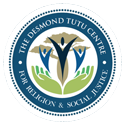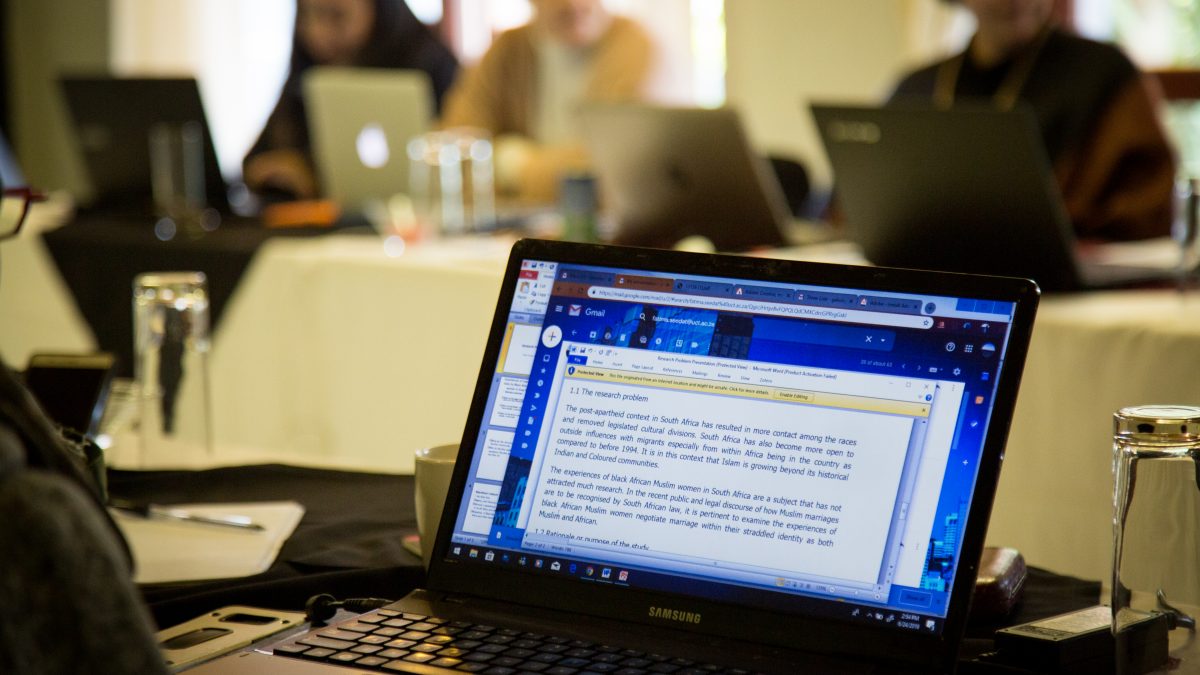
Council for World Mission Workshop, Subversive bodies, hopes and desires: Humanness under Empire
08/08/2019
African Traditional Religion: Status and Practice in South Africa
12/08/2019Writing Retreat I
June 2019, Joie de Vivre Country Estate, Klapmuts, Paarl
Knowledge intake ought to become knowledge translation, therefore the skills we acquire from the workshops and seminars must be translated into writing, i.e. complete thesis/dissertation proposals and dissertations. In order to ensure this, the Centre offers students a week-long writing retreat as a means of creating an atmosphere of focus for productive writing. Our first-year students (PhD and Masters) attended the retreat held at Joie de Vivre conference facility in Klapmuts, Paarl. During the retreat, both students and their supervisors committed themselves, around the clock to the writing process.
The main goals of the retreat were:
● to help students to learn from each other about the process of writing;
● to create a multidisciplinary community of research writers who would provide
● support and advice to one another;
● to explore the important links between teaching, research, writing and scholarship;
● to have a productive working experience in which each participant would commit to a specific writing goal and try to achieve it. (Moore, 2003)
Reviews and Testimonials:
“Having worked in the corporate world for many years, I was very aware that the investment put into the writing retreat was far greater than the actual cost of accommodation and catering – unlimited access to the academic experience of four PhDs, one of which was a professor and, add to that, an estimate of their remuneration day rate, you end up with an investment that far surpasses the value perception of any academic retreat. For me, the writing retreat was a true demonstration of the spirit of generosity on the part of the Desmond Tutu Centre for Religion and Social Justice, the supervisors and my peers”.
– Nobesuthu Tom, Honours Student, Religion and Theology, University of the Western Cape
“A huge privilege to be part of a retreat that allowed me to explore, daily, the important links between research, writing and scholarship. A secluded space of minimal distractions and maximum productivity as far as writing is concerned”.
– Rhine Koloti, Masters Student, Religion and Theology, University of the Western Cape
“My work was used as an example for most of the retreat, and by putting it up there on the screen, it allowed me to notice my own faults, and gave others the opportunity to give me valuable feedback. Although it left me completely vulnerable, it was not a scary or embarrassing vulnerability, but rather one of development and growth. That
is always my favourite part of the cohort, knowing that I will leave with so many new ideas and improvement suggestions that can only better the quality of my work.”
-Ashleigh Petersen, Masters Student, Religion and Theology, University of the Western Cape
Writing Retreat II
October 2019, Protea Hotel Saldanha Bay
The Centre hosted its fourth successful writing retreat for postgraduate students. This retreat was framed as a “finishers” retreat, which provided the space and support for students who were completing either their proposals or chapters of their dissertations.
The writing retreat was attended by eleven students and nine mentors and supervisors.
The retreat began with students presenting posters which summed up their research projects. This was a useful exercise as it allowed students to reflect on their research projects as an integrated whole which required each part to be well-developed and holistically thought through. This was followed by in-depth presentations where students focused on specific chapters or areas of their research which they felt needed the most attention. This allowed students to receive and provide feedback as well as to identify areas of writing which required their focus for the week.
The writing retreat provided students with plenty of dedicated writing time. Students were also able to make appointments with any of the mentors and supervisors throughout the week to discuss their work. A writing coach was also available for individual consultations throughout the retreat.
The retreat ended with an emotionally charged concluding session. Many of the students have been attending cohorts together for three years and this retreat signalled the end of their journey. The closing session provided an opportune moment for students to reflect together on the personal and academic challenges and successes which they have experienced and a final opportunity to offer affirmation and support. This serves as evidence of the scholarly community produced by the cohort programme and signals the necessity and strength of the holistic system of support and supervision the Centre has developed for postgraduate students.
As an outcome of the writing retreat mentors and supervisors were able to complete their own work. Articles by Prof Sarojini Nadar and Dr Fatima Seedat, as well as by Dr Alease Brown have since been submitted for publication and will be published later this year. One of our PhD students, Dr Megan Robertson also completed her findings chapters during this week and successfully submitted her final dissertation in November 2019. Two Masters students, Ashleigh Petersen and Rhine Koloti, also completed their proposals during this week which they have since submitted and both been accepted. Almost all other students on the writing retreat were also able to complete significant portions of their dissertation chapters.
Reviews and testimonials
“I had an overwhelmingly positive experience of the UWC DTC cohorts in 2019. From the organisation of the sessions to the depth of feedback given to all participants, the space presented the perfect opportunity for workshopping rigorous academic research. On the surface, every session had sufficient materials, food, and drink for all participants which was welcome given the inevitable hair-pulling academic research yields. It was lovely having tea breaks in between furious writing and getting to vent about the day’s difficulty. But beyond the easy camaraderie the organisation of the space offered, the ability of the workshop coordinators to fuel creative energy was exceptional and fed me more than coffee and biscuits ever could. Every roadblock I had in my research, most of which was methodological, was met with an incredible amount of patience and intense thinking energy. Academia is notorious for being a lonely field – images of students locked away in dusty libraries on two hours of sleep and Maggi noodle dinners come to mind here. But in the DTC cohorts, I felt like I was finally able to breathe in a space where I knew my breath would be felt. I am really grateful for the progress I made with those colleagues and the care with which everyone’s issues were seen. I mean it when I say that I was academically fed, clothed, and sheltered amongst some of the greatest minds and hearts I’ve ever encountered.”
-Andy Smit, Masters student, University of Cape Town
“My first day at Cohort was a rude awakening. My idea was unpolished, I could not even properly articulate it for myself let alone share it with strangers. Soon after we did our introductions, we got into groups to help each other develop our ideas, to be later presented in a process called gallery walk. The way it worked was, in our groups we would write on posters entailing the purpose of our research and answer the three research questions; who, what and why? Then put them up on display, walk poster to poster with each of us presenting our ideas.
Our group interactions were quite intense and fruitful. We were thrown into a situation where for the first time we were forced to think deeper about our research. We were compelled to also assist each other because we soon realised, we were in the same boat, this forged a sense of instant solidarity. We hardly knew each other’s names and yet we were caught up in robust engagements about important work that carried our aspirations and futures.
When my turn to present came, the feedback felt like a baptism of fire! I acknowledge, it was tough at the time but with hindsight, something I’m grateful for. I was also humbled that so many smart people took time to engage with my work and interacted with it in ways I had not thought of. Now in my second and final year of my research Masters, I credit my progress to my cohort journey. Cohort creates a support group where we hold each other accountable with regards our research goals. Given the many obstacles I faced in 2019, being part of the cohort stopped me from dropping out and strengthened my resolve to complete my research.”
–Gaboitsiwe Kgomongwe, Masters student, University of Cape Town

